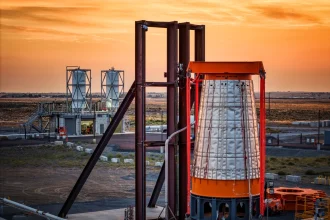While Latin America has traditionally been a consumer market for global digital services, it’s quickly emerging as a key hub for digital infrastructure. The region is currently home to 4.8% of data centers worldwide, as per the United Nations Development Programme (UNDP), its data center market is projected by the Inter American Bank to double by 2029, reaching $10 billion.
This surge reflects the climbing demand for artificial intelligence, as energy consumption and the need for larger, more sophisticated data centers have become urgent. Global demand for data center capacity is set to grow from 19% to 22% every year until 2030, and Latin America is poised to capture a lot of that expansion.
Why Latin America and why now?
Photo by AIII YOOOO / Unsplash
New localization rules and the push for nearshoring to the U.S. have led Latin America to rise as a digital infrastructure hub, due to its growing startup ecosystem, strategic proximity, and renewable energy capacity.
Supply chain resistance is critical nowadays, so proximity to the United States makes the region attractive for nearshoring. Locating data centers close to North America strengthens supply chains and service reliability.
Recently, Brazil, Mexico, and Argentina implemented data localisation rules requiring some sensitive and personal data to be stored within national borders, pushing global companies to build locally.
The timing of this boom is not accidental. Regional governments are advancing policies that attract investment in digital infrastructure: Chile, for example, launched the National Data Centers Plan, pledging $2.5 billion in investment for digital infrastructure.
Latin America’s land, water, and energy resources provide great potential for a digital infrastructure hub with carbon-neutral commitments. With Brazil and Mexico being part of the “industrial sunbelt,” they now make up 59% of the world’s clean industrial projects.
AI demand accelerates infrastructure demand.

As businesses and individuals integrate AI into daily life, the call for more sophisticated digital infrastructure also grows.
Cesar D’Onofrio, CEO of Making Sense, a software company that delivers digital transformation solutions for mid-market companies, sees “AI as the next transformative wave, on par with the internet,” enabling small teams to achieve massive efficiency gains. He believes businesses have a unique opportunity to outpace mature companies by leveraging AI and no-code tools.
Making Sense LLC has offices in California, Argentina, and Mexico. Their presence in Latin America shows how the need to implement AI to modernize operations and improve efficiency is intrinsically tied to the demand for more digital infrastructure.
Brazil leads the data center boom.

The region’s data centers are concentrated in Brazil, with Rio de Janeiro poised to host the largest data center campus in Latin America. Announced at the opening of the Web Summit Rio in April 2025, the “Rio AI City” will be located in the city’s Olympic Park and will have a planned capacity of 1.8GW operational by 2027, with potential expansion to 3.2GW by 2032.
This project is led by Elea Data Centers, with Oracle and Nvidia signing a memorandum of understanding to join the initiative as partners in August 2025. Once completed, it will reportedly become one of the largest data center campuses in the world.
Outside of Brazil, countries like Colombia, Peru, and Costa Rica are also attracting investment. For example, Colombia now represents 10% of the region’s data center market, with its worth expected to surge from $560 million USD in 2023 to $90 million USD in 2029.
According to Mike Hoey of Source Meridian, one of the largest tech employers in Colombia, the pace of technological change drives Latin America’s growing digital infrastructure needs. Hoey, who specialises in life science and big data, said it was difficult in the past to access and anonymise data for analysis purposes. This underlines why a robust IT infrastructure, like cutting-edge data centers, is critical in the region.
Chile’s national plan with a green bid

Chile’s National Data Centers Plan, aims to position the country as a leading digital infrastructure hub. According to the Ministry of Science, Technology, Knowledge and Innovation, Chile currently has 22 data centers and expects to house 28 more by 2030.
Scala Data Centers, a Brazilian platform for sustainable digital infrastructure, secured its first international deal in Chile, amassing $254 million in long-term funding to construct three hyperscale data centers and a major power substation.
Chile’s renewable solar and wind energy capacity becomes a unique selling point. Google’s 2024 Environmental Report indicates that Chile is the greenest data center powerhouse in the global south, with 91% of its energy grid coming from carbon-free sources, ahead of Brazil’s 90%.
Resource intensity and local concerns

Data centers require great amounts of power, water, and land to meet computing and processing needs. This rapid development of data centers in Latin America is placing additional strain on local energy and water systems.
Climate change and rising temperatures mean that the cooling systems in IT infrastructure increase water consumption.
In Querétaro, an area with existing water shortages, Amazon, Google, and Microsoft have established data centers. Given the substantial amounts of water required, this has raised questions about whether blackouts and droughts are the prices local communities have to pay.
Similarly, the construction of a new data center in Brazil, reportedly for TikTok, has intensified debates about resource allocation.
Last year, Google withdrew plans to develop a $200 million data center in Chile after residents expressed concern over the center’s water usage.
Many companies have attempted to achieve sustainability goals to mitigate this. For example, Google said it would revise its project in Chile to abide by stricter environmental requirements, changing its water-cooling system.
Conclusion
Governments, communities, and companies will benefit from the economic growth this expansion brings, while grappling with the effective resource management it requires. This balance will determine the future of the technology landscape in the region.
Latin America is undoubtedly experiencing a data center “boom,” but the true question lies in whether the region will leverage this growth in infrastructure to foster innovation that benefits the area in the digital revolution.
Isabella Lapadula is a Venezuelan journalist reporter Fellow at ESPACIO Media Incubator, and her work has appeared in Al Jazeera English, Entrepreneur Magazine en Español, The Latin Times (from the International Business Times), El Nacional, and other publications.


















